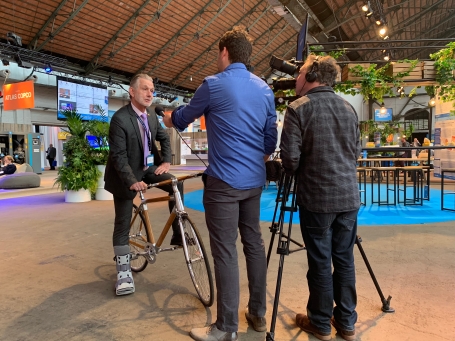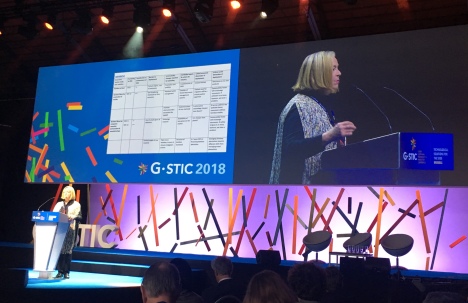INBAR was part of the 2017 Global Science, Technology and Innovation Conference (G-STIC), and we were again invited to attend this year. Unlike last year, when we arranged a whole day discussion, we were given one hour, but at prime time. The INBAR session would take place as a plenary session in the main hall, just before dinner during the “industry night” on day 2. We also were offered a space for INBAR to engage with the participants.

During the preparations, the organisers of G-STIC suggested that I should bring several private sector representatives from China. Dr Pablo van der Lugt, Head of Sustainability at MOSO International in the Netherlands was also invited, and he and I agreed to co-host the evening, and make it a little less formal and more interesting. The idea developed into a dialogue between the two of us, during which we invited several other speakers to the podium for short interventions. One of the added pieces of entertainment was the presence of a bamboo bicycle, which I had shipped from Beijing to Brussels. It was a donation from Charlie Du at TUS Clean Energy, and when the bicycle arrived at the venue, it created a lot of attention. Everybody wants to ride a bamboo bike!

PS: The boot is helping to settle two broken toes
Pablo used the bicycle as his entrance to the INBAR session, and it provided an immediate topic for discussion. We told the audience that the bike would be given away at the end of the evening, and encouraged everybody to put their business card in a box. I kicked off our session with a few words about bamboo and INBAR, and I then invited Pablo to introduce his book “Booming Bamboo” and give a talk about bamboo, similar to what he had done for us during the June Bamboo and Rattan Congress – BARC2018.

Pablo van der Lugt is presenting “booming Bamboo”
After Pablo’s introduction, we talked a little about possible bamboo value chains, and I invited Ms Shen Genlian to the podium. Ms Shen is the CEO and Chair of the Board of VANOV New Material Co., Ltd in Meishan, Sichuan Province; a company that produces bamboo tissue paper. One of the reasons for inviting her is the strategic partnership that INBAR and Meishan have signed, and exposure to international events is our part of the bargain. The other reason is that we visited her company after BARC 2018, and we were all very impressed with what we saw: a state-of-the-art clean, bright factory that produces unbleached, ecologically produced Babo tissue paper from bamboo fibres.

Celebrating a successful G-STIC at the VANOV stand
Ms Shen showed a brief video, explained what they do through her interpreter, and received warm applause. One of the aspects of her business that struck me is the fact that she supports 10,000 or more local farmer households, who supply her factory with the necessary bamboo. That suggests some 50,000 people are directly dependent on VANOV company, which is a daunting responsibility but also a beautiful example of local community involvement.

Ms Shen Genlian and her interpreter Jacky
Pablo followed Ms Shen’s presentation by inviting Hans Heijmans, Account manager with HR Group in the Netherlands to talk about the bamboo road signs that his company is producing. Several towns in the Netherlands have decided to get rid of all aluminium traffic signs, and HR is supplying the alternative signs made from bamboo. Hans had also brought a pavement protection pillar from Amsterdam. These so-called “Amsterdammertjes” are typically made from concrete, but this one is made from bamboo.

It was encouraging to hear a Dutch company talk about bamboo product development, as it is very important to show people in Europe that bamboo is not just a product from Asia, but that European companies are also looking at manufacturing and sales.
After the presentation from Hans Heijmans, I invited Mr Ye Lin from Hangzhou to come to the podium, together with his interpreter. Mr Ye is the Director of the National Forestry and Grassland Administration Engineering Research Center for Bamboo Winding Composites, and President of Zhejiang Xinzhou Bamboo-based Composites Technology Co., Ltd. He has pioneered the use of bamboo fibres in the manufacturing of composite material for the production of drainage pipes, railway carriages and housing units. Mr Ye showed a short video and then told us that the underlying philosophy of Xinzhou company is to reduce the pressure on our natural resources, and developing a green supply chain. He stressed that the pipes are already being installed in several places in China, and there are orders for the supply of the housing units.

The bamboo fibre winding technology is one of the most exciting bamboo developments in China in recent years, and could be an industry that can be rolled out along the Belt and Road. In this respect, Mr Ye explained that he is already talking with Nepal and Philippines about the creation of joint ventures.
He was followed by Dr Jiang Jingyan, the Dean of the Yong’An Institute of Bamboo Industry in Fujian Province. Yong’An is a new bamboo centre, and they are looking for international profile and recognition. INBAR has signed a strategic partnership agreement with Yong’An and we therefore invited Dr Jiang to tell us about the progress and the plans for the future. His talk and slide show touched on many aspect of bamboo development, as Yong’An wants to become a general supply centre of all types of bamboo products.
One of the key priority areas for Yong’An is furniture production, and the quality and design of the items produced in Yong’An is very good. I was there a few weeks ago for the bamboo ware fair, and I saw with my own eyes what Yong’An is producing. It includes this amazingly stylish chair:

Pablo and I agreed that this was the end of our session, but before calling it a day we invited Charlie Du, Senior Vice President of Beijing TUS Clean Energy Technology Co. Ltd, to tell us about the bamboo bicycle and other innovations that TUS is working on. Charlie explained that the bicycle is merely a test case, but the main area of interest of TUS Clean Energy is the optimal manufacturing of the blades for modern wind turbines, and this includes the use of bamboo fibres. He told us that there is a wind turbine with bamboo blades that has been in operation for several years, and TUS Wind sees this as a major area for expansion.
In a follow-up meeting, Charlie told me that TUS has signed an agreement with a consortium in the UK, involving universities in Liverpool and Cambridge and the Catapult programme. The Catapult centres are a network of world-leading centres designed to transform the UK’s capability for innovation in specific areas and help drive future economic growth. (https://catapult.org.uk/)
Charlie then pulled a name out of the box of business cards, and the lucky winner of the bamboo bicycle is Dr Lieve Fransen. Dr Fransen is a senior policy maker and advisor to the European Commission, and it was very appropriate that she won the bicycle.

Dr Lieve Fransen and her bamboo bicycle
The day after our bamboo session, Dr Veerle van der Weerd presented a wrap-up of the event, and listed some of the key findings. I was very happy that she used bamboo as one of the examples to show how nature-based solutions can help with Sustainable Development.

Dr Veerle van der Weerd mentions bamboo in her closing speech
During the two-and-a-half days in Brussels, I met a whole host of people, and made interesting contacts for the future. But – the bamboo session was the main reason for being in G-STIC 2018, and it was worth it!
